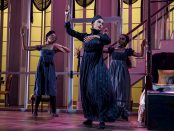Stereophonic
David Adjmi’s "Stereophonic" at the Golden Theatre, a transfer under the auspices of Playwrights Horizons, is a minutely detailed, almost minute-by-minute recreation of a recording session by a rock band, purportedly based on Fleetwood Mac’s creation of its epic album "Rumours" in 1976. (Adjmi has denied that this was his inspiration, claiming that the show has an amalgam of sources.) [more]






